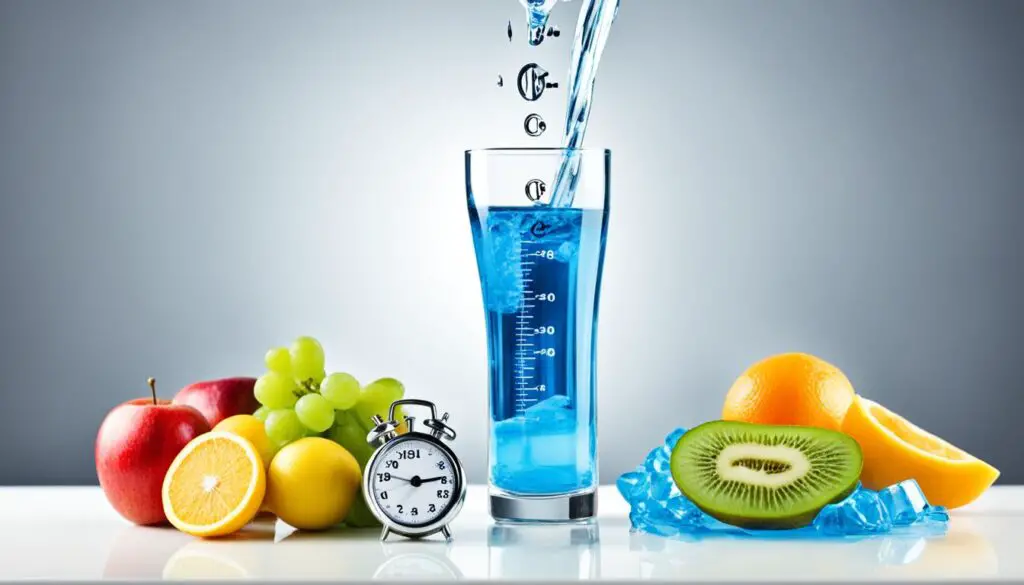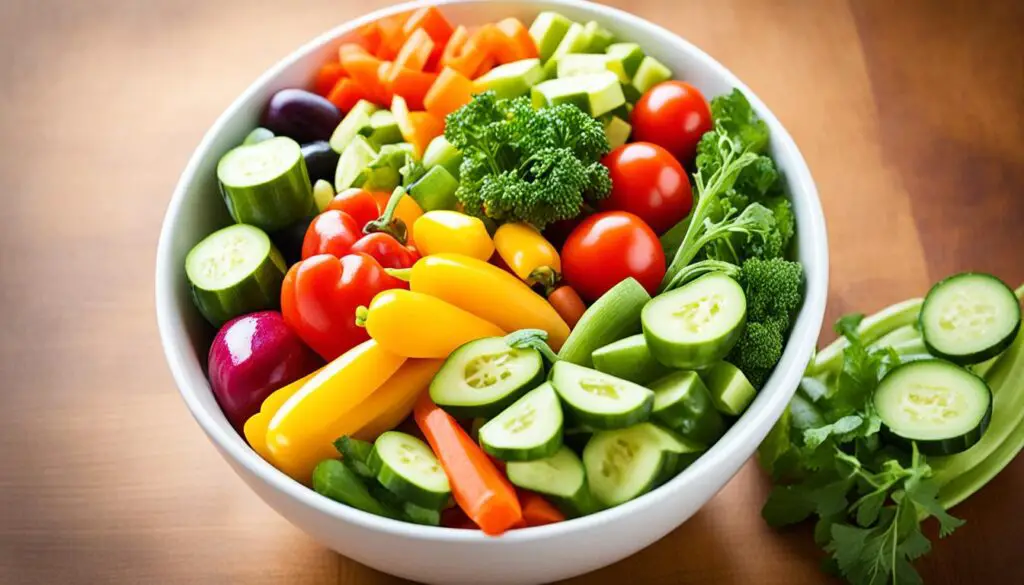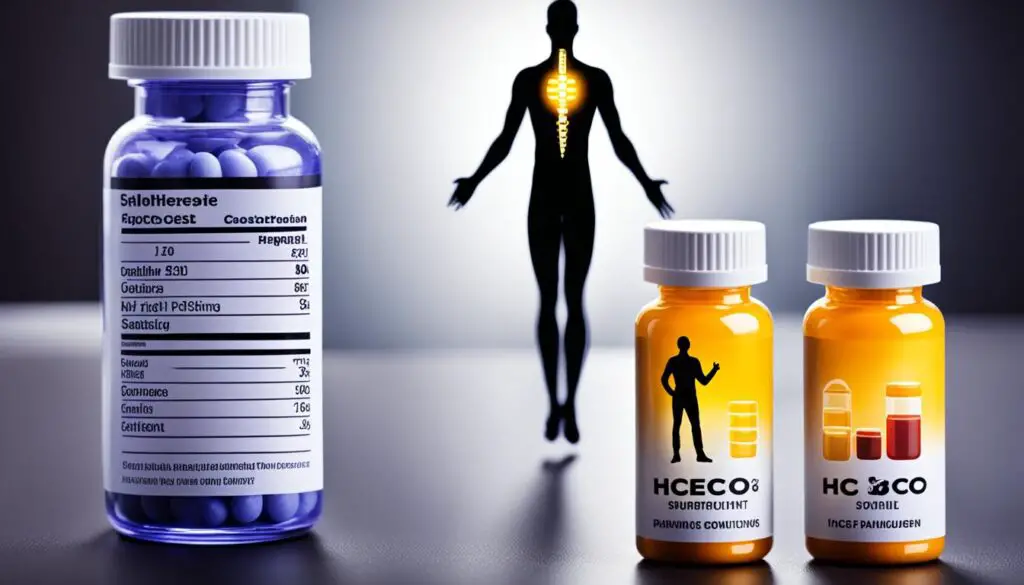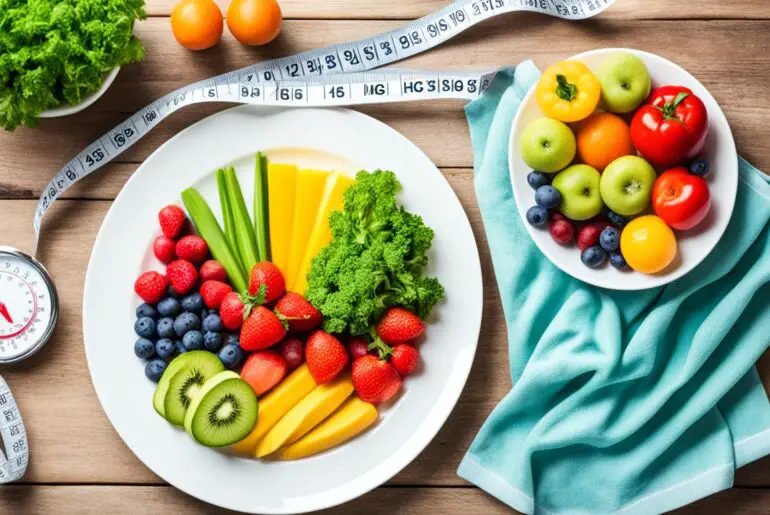Are you struggling with nighttime hunger on the HCG diet? Cravings and hunger pangs can make it challenging to stay on track with your weight loss goals. But fear not! There are effective solutions to help you curb hunger and successfully manage nighttime cravings during the HCG diet program.
Implementing certain strategies and incorporating hunger suppressants can make all the difference. So, if you’re ready to conquer those late-night cravings and achieve optimal results, keep reading to discover the secrets to reducing hunger on the HCG diet.
- Tips and strategies to control hunger at night on the HCG diet.
- The role of hydration in hunger suppression.
- The importance of meal timing and protein intake in managing hunger.
- The power of fiber-rich foods in alleviating nighttime hunger.
- The potential for adjusting HCG dosage to regulate hunger levels.
Understanding Hunger on the HCG Diet
In the early stages of the HCG Diet, it is common to experience nighttime hunger as your body adjusts and starts to release stored fat for fuel. While the program generally becomes easier over time, some individuals may still encounter moments of hunger during the HCG diet journey. Understanding the nature of hunger and its impact on the body is crucial for finding effective solutions to manage and overcome nighttime hunger on the HCG diet.
When following the HCG diet, the body undergoes significant changes. It transitions from relying on carbohydrates for energy to utilizing stored fat as its primary source of fuel. This shift can lead to hunger pangs, especially during the initial stages of the diet.
Recognizing that experiencing hunger during the HCG diet is a normal part of the process can help individuals mentally prepare and stay focused on their weight loss goals. Moreover, understanding the underlying physiological mechanisms can offer insight into effective strategies for managing hunger and cravings.
One of the key benefits of the HCG diet is that it encourages the body to tap into its fat stores, which can result in rapid weight loss. However, it’s essential to recognize that this process also prompts the release of certain hormones that can stimulate appetite. This hormonal response is a natural defense mechanism designed to protect the body from starvation.
During the HCG diet, it is vital to strike a balance between achieving weight loss and managing hunger. By implementing practical strategies, individuals can find ways to curb nighttime hunger and remain on track with their diet plan.
Next, we will explore various methods and techniques to effectively manage hunger and control nighttime cravings on the HCG diet. From hydration and meal timing to incorporating fiber-rich foods and adjusting HCG dosage, these strategies can make a significant difference in overcoming nighttime hunger and achieving successful weight loss.
Hydration and Hunger Suppression

Staying hydrated is key to managing hunger on the HCG diet. By drinking 2-4 liters of water or herbal tea daily, you can effectively suppress your appetite and reduce cravings. Additionally, caffeinated beverages like coffee and green tea act as natural hunger suppressants, helping you stay on track with your diet goals.
It’s important to note that on the HCG diet, only stevia should be used as a sweetener. Avoid other sweeteners that may contain calories or impact your blood sugar levels. By prioritizing hydration and incorporating natural hunger suppressants, you’ll be better equipped to control hunger, especially at night.
Meal Timing and Protein Intake
When it comes to managing hunger during the HCG diet, meal timing and protein intake play a significant role. By properly spacing out meals and ensuring an adequate amount of protein, you can help minimize cravings and reduce nighttime hunger.
Some individuals may find that eating smaller, more frequent meals throughout the day suits them, while others prefer having one larger meal. Both approaches can be effective, so choose the one that works best for your body and preferences.
It is essential to consume the recommended 3.5-4 ounces of protein per meal on the HCG diet. Protein is known for its satiating effect, keeping you fuller for longer and reducing hunger between meals. Incorporate lean sources of protein such as chicken, fish, lean beef, tofu, or eggs into your meals to ensure you meet your protein needs.
Benefits of Proper Meal Timing and Protein Intake
“By spacing out meals and focusing on protein-rich options, you can maintain a more balanced blood sugar level throughout the day, which helps control hunger and cravings.”
A well-timed meal plan coupled with adequate protein intake offers several benefits for managing hunger on the HCG diet. These include:
- Sustained energy levels throughout the day
- Improved blood sugar regulation
- Reduced cravings and hunger pangs
- Enhanced metabolism and fat-burning potential
By strategically planning your meals and ensuring sufficient protein intake, you can better manage hunger, optimize weight loss, and stay on track with your HCG diet goals.
| Meal Timing and Protein Intake Strategies | Benefits |
|---|---|
| Eat smaller, more frequent meals |
|
| Opt for one larger meal |
|
| Ensure 3.5-4 ounces of protein per meal |
|
By implementing these strategies, you can effectively manage hunger during the HCG diet and stay committed to your weight loss journey.
Free Vegetable Options and Fiber-Rich Foods

When it comes to combating nighttime hunger on the HCG diet, incorporating “free food” options can be a game changer. Not only do these low-calorie options provide essential nutrients, but they also offer a generous amount of fiber, helping to keep you satiated for longer. Here are some vegetable choices that can help alleviate hunger cravings:
- Egg Whites
- Celery
- Cucumber
- Radishes
- Lettuce
- Cabbage
These fiber-rich foods can be consumed in larger quantities without impacting your weight loss progress. Their low caloric content allows you to enjoy them guilt-free while helping you stay full. Adding these free vegetable options to your meals can provide the extra boost you need to curb nighttime hunger on the HCG diet.
| Vegetable | Fiber Content | Calories* |
|---|---|---|
| Egg Whites (2 large) | 0g | 34 |
| Celery (1 stalk) | 1g | 6 |
| Cucumber (1 cup sliced) | 0.6g | 16 |
| Radishes (1 cup sliced) | 1.9g | 19 |
| Lettuce (1 cup shredded) | 0.5g | 5 |
| Cabbage (1 cup shredded) | 1g | 22 |
*Calories are approximate values and may vary depending on the size and preparation.
By incorporating these fiber-rich vegetables into your HCG diet, you can not only satisfy your hunger but also contribute to your overall well-being. Next, we’ll explore additional strategies to help you successfully manage hunger on the HCG diet.
Adjusting HCG Dosage
If you find yourself experiencing persistent hunger despite implementing other hunger management strategies, it may be necessary to consider adjusting your HCG dosage. By increasing or decreasing the amount of HCG taken, you can regulate hunger levels and enhance overall satisfaction during the diet.
However, before making any dosage adjustments, it is important to consult with a healthcare provider or HCG specialist. They can provide personalized advice based on your individual needs and ensure that the dosage change aligns with your overall health and weight loss goals.
Adjusting HCG dosage should not be done without professional guidance, as the optimal dosage can vary from person to person. By working closely with a healthcare professional, you can find the right balance to effectively curb hunger during the HCG diet.
Expert Insight:
“When it comes to managing hunger during the HCG diet, adjusting the HCG dosage can be a game-changer. By fine-tuning the amount of HCG you take, you can experience improved hunger control, which in turn supports adherence to the diet and helps achieve your weight loss goals.” – Dr. Amber Thompson, HCG Specialist
Increasing HCG Frequency

In certain cases, spreading out HCG doses more frequently throughout the day can help to curb hunger during the HCG diet. Even if the total amount remains the same, dividing the daily dose into four smaller doses, for example, can be beneficial for individuals working long shifts or overnight hours. By increasing the frequency of HCG administration, you can maintain consistent levels of the hormone in your body, which may contribute to a decrease in hunger.
When spreading out the HCG doses, it is important to ensure that the total daily dosage remains the same. This practice allows you to manage your hunger more effectively without compromising the effectiveness of the HCG diet. Working closely with a healthcare provider or HCG specialist is essential when considering adjustments to your dosage frequency.
Water Intake and Weight Loss

Adequate water intake plays a critical role in achieving successful weight loss while on the HCG diet. Not only does it help keep you hydrated, but it can also enhance the effectiveness of the diet and reduce hunger. As a general guideline, it is recommended to consume 0.5 to 1 ounce of water per pound of body weight per day.
Spacing out water consumption throughout the day is essential for optimal hydration and kidney health. By sipping water consistently throughout the day, you can maintain proper hydration levels and help manage hunger during the HCG diet program.
Benefits of Adequate Water Intake
- Enhanced metabolism: Drinking enough water helps boost your metabolism, allowing your body to burn calories more efficiently.
- Improved digestion: Ample water intake aids in digestion and prevents constipation, ensuring that your body can effectively eliminate waste.
- Appetite control: Staying hydrated can help curb your appetite and reduce cravings, making it easier to manage hunger during the HCG diet.
- Energy boost: Dehydration can cause fatigue and low energy levels. Drinking enough water keeps you energized throughout the day.
- Healthy skin: Proper hydration promotes healthy skin, leaving it moisturized and glowing.
Strategies to Ensure Sufficient Water Intake
- Carry a water bottle: Having a water bottle with you at all times serves as a constant reminder to stay hydrated.
- Set reminders: Use alarms or smartphone apps to remind yourself to drink water regularly.
- Flavor your water: If plain water becomes monotonous, try infusing it with fresh fruits or herbs to add a pleasant taste.
- Monitor urine color: Checking the color of your urine is a simple way to assess your hydration levels. Clear or pale yellow urine indicates proper hydration.
- Include water-rich foods: Incorporate foods with high water content, such as cucumber, watermelon, and oranges, into your diet to boost your overall hydration.
Real HCG vs. Placebo

When following the HCG diet, it is crucial to distinguish between real HCG and placebo products. Real HCG, obtained through legitimate sources, plays a vital role in the proper functioning of the diet and hunger suppression. To ensure the desired results and effectively control hunger, it is essential to purchase HCG from reputable sources.
Real HCG is commonly available in the form of prescription injections or pellets. These products contain the necessary hormone that aids in weight loss and hunger management during the HCG diet. By obtaining real HCG from authorized sources, individuals can rest assured that they are receiving a genuine product that adheres to stringent quality standards.
- Real HCG obtained from legitimate sources is a key component of the HCG diet.
- These products contain the necessary hormone for hunger suppression.
- Reputable sources such as prescription injections or pellets should be used to purchase HCG.
By differentiating between real HCG and placebo products, you can ensure that you are effectively managing hunger and maximizing the benefits of the HCG diet. When it comes to purchasing HCG, always prioritize authenticity and quality for optimal results.
Benefit of Real HCG vs. Placebo
| Real HCG | Placebo |
|---|---|
| Contains the necessary hormone for hunger suppression | Does not have hunger-suppressing properties |
| Obtained from reputable sources | May be counterfeit or subpar |
| Adheres to quality standards | Quality may vary |
Conclusion
Hunger management is a crucial aspect of the HCG diet to ensure successful weight loss and adherence to the program. Incorporating strategies such as proper hydration, meal timing, protein intake, and free vegetable options can help control cravings and reduce nighttime hunger. Consultation with a healthcare provider or HCG specialist is recommended for personalized advice and dosage adjustments if needed. By implementing these HCG diet hunger solutions, you can overcome nighttime hunger and achieve your weight loss goals.
FAQ
What can I do to manage nighttime hunger on the HCG diet?
To manage nighttime hunger on the HCG diet, you can try implementing strategies such as staying hydrated, spacing out meals, and incorporating “free food” options.
How can staying hydrated help with hunger suppression on the HCG diet?
Staying hydrated is essential for managing hunger on the HCG diet. Drinking 2-4 liters of water or herbal tea daily can help suppress appetite and reduce cravings.
Are there any hunger suppressants I can use on the HCG diet?
Caffeinated beverages such as coffee and green tea act as natural appetite suppressants on the HCG diet. However, it is important to use stevia as the sweetener.
How can meal timing and protein intake help reduce nighttime hunger on the HCG diet?
Properly spacing out meals and ensuring adequate protein intake can help minimize hunger during the HCG diet. Consuming the recommended 3.5-4 ounces of protein per meal is crucial for satiety and reducing hunger between meals.
Are there any free food options that can help alleviate hunger on the HCG diet?
Yes, incorporating “free food” options such as egg whites, celery, cucumber, radishes, lettuce, and cabbage can provide additional fiber and help alleviate hunger on the HCG diet. These low-calorie, nutrient-dense options can be consumed in larger quantities without impacting weight loss progress.
What should I do if I still experience persistent hunger on the HCG diet?
If persistent hunger is experienced despite implementing other hunger management strategies, consider adjusting the HCG dosage. Increasing or decreasing the amount of HCG can help regulate hunger levels and improve overall satisfaction during the diet. Consultation with a healthcare provider or HCG specialist is recommended before making any dosage adjustments.
Can spreading out HCG doses throughout the day help alleviate hunger?
Yes, in some cases spreading out HCG doses more frequently throughout the day, even if the total amount remains the same, can help alleviate hunger. Dividing the daily dose into four smaller doses can be beneficial for individuals working long shifts or overnight hours.
How does water intake affect weight loss on the HCG diet?
Adequate water intake is crucial for successful weight loss on the HCG diet. Consuming 0.5 to 1 ounce of water per pound of body weight can enhance the effectiveness of the diet and reduce hunger. Spacing out water consumption throughout the day is recommended for optimal hydration and kidney health.
Why is it important to distinguish between real HCG and placebo on the HCG diet?
It is important to distinguish between real HCG and placebo products when following the HCG diet. Real HCG, obtained through legitimate sources, is necessary for the proper functioning of the diet and hunger suppression. Purchase of HCG from reputable sources, such as prescription injections or pellets, ensures the desired results.
What are some effective solutions to help manage hunger on the HCG diet?
Some effective solutions to help manage hunger on the HCG diet include staying hydrated, spacing out meals, incorporating “free food” options, adjusting HCG dosage if needed, increasing HCG frequency, and ensuring proper water intake. Consulting with a healthcare provider or HCG specialist can provide personalized advice and guidance.




